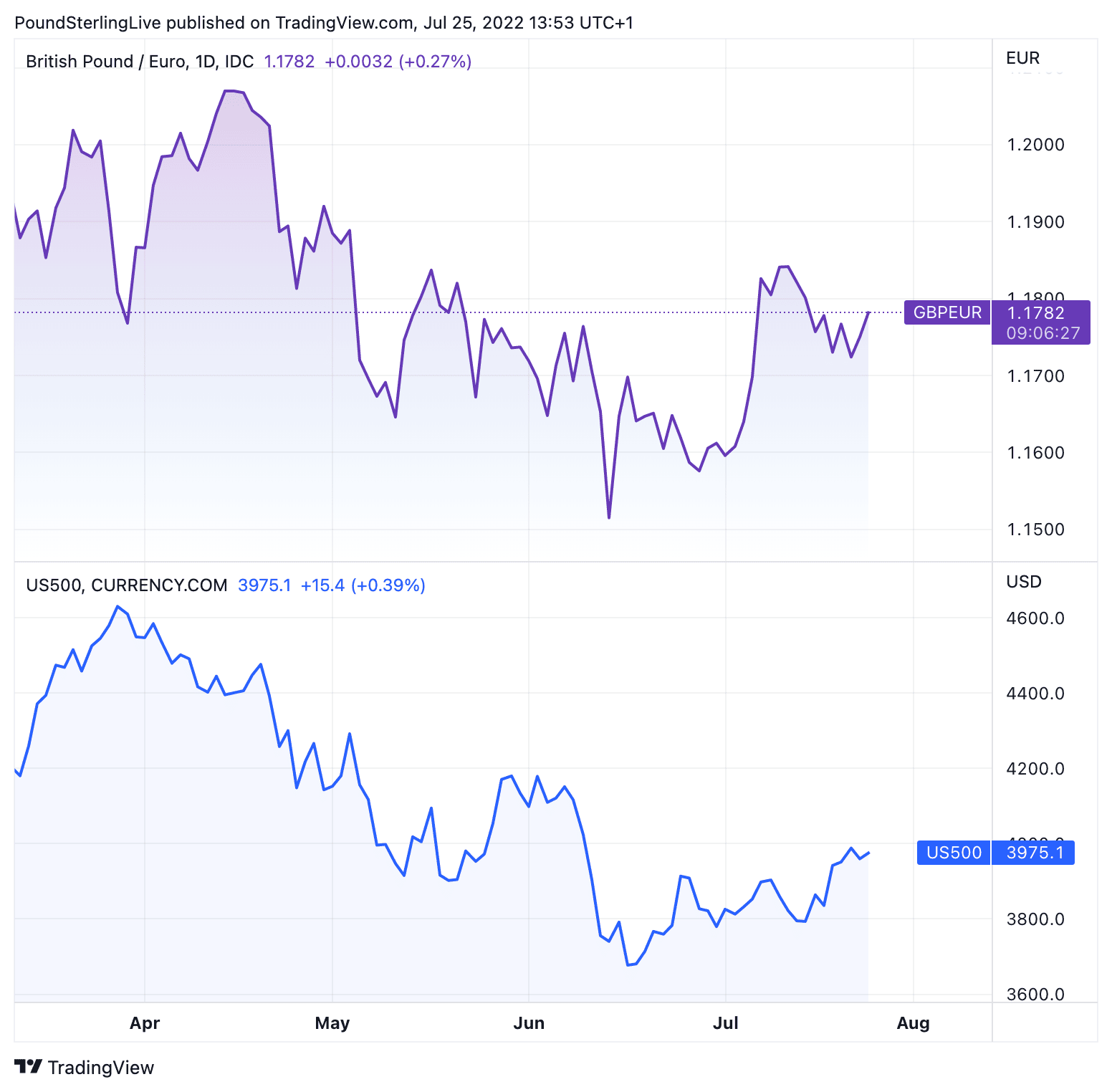Pound Sterling in Strong Start against Euro & Dollar as Risk Sentiment Supports
- Written by: Gary Howes

Image © Adobe Images
The British Pound is stronger against the Euro, Dollar and other currencies in the final week of July with an improved sentiment amongst global investors being attributed to the outperformance, analysts expect it to remain supported if the midweek Federal Reserve interest rate hike doesn't spook investors.
Despite a wall of worries blocking visibility - including EU gas supplies from Russia, surging global inflation and central bank monetary tightening - global stock markets continue a tepid rise off their mid-June lows.
This is in turn helping the Pound which tends to display a positive correlation with broader sentiment.
"Sterling will look to take cues from risk appetite and sentiment as well as being dictated by moves on other currencies," says Thanim Islam, Dealer Manager at Equals Money.
Should further improvements in sentiment be realised over coming days the Pound could find itself better supported in the run-up to the fast approaching August 04 Bank of England policy decision.
"We expect sterling to trade with broad dollar and European risk sentiment... the GBP has so far been resilient to political risks associated with the conservative party leadership contest," says Juan Prada, analyst at Barclays.
The U.S. S&P 500 stock index is often used by investors and analysts to gauge global market sentiment and it therefore offers a gauge for a given currency's relationship to risk.
Above: GBP's correlation with broader investor sentiment, depicted in the chart of GBP/EUR (top) against the S&P 500 (bottom).
"The S&P 500 is about 9% above its June lows. The bump is down to a couple of things. One earnings are pretty good," says Neil Wilson, Chief Market Analyst at Capital.com.
The Pound to Euro exchange rate rose a third of a percent to 1.1788 with bank accounts quoting in the region of 1.1559 on euro payments and FX specialists quoting around 1.1750. The Pound to Dollar exchange rate was higher by half a percent at 1.2043 with banks quoting around 1.18 and specialists at 1.20.
Francesco Pesole, FX Strategist at ING, says the British Pound "should continue to move in line with risk appetite."
In this regard, the key event for investors this week is Wednesday's Federal Reserve policy decision, where another interest rate hike is likely; the scale of that hike and guidance as to the number of further hikes should hold interest for currencies.
"The biggest event of the week ahead will undoubtedly be the Fed policy meeting on July 27. Not very long ago, the market was debating whether the FOMC would follow the example set by the BoC earlier this month and hike rates by 100 bps this month. However, by the end of last week not only had expectations been pared back to 75 bps this week, but the market had to begun to price out larger moves further out," says Jane Foley, Head of FX Strategy at Rabobank.
Compare Currency Exchange Rates
Find out how much you could save on your international transfer
Estimated saving compared to high street banks:
£2,500.00
Free • No obligation • Takes 2 minutes
The Federal Reserve's interest rate hiking cycle raises the cost of money, not just in the U.S. but globally, given the U.S. Dollar significance in global trade and finance.
Costlier money means lending slows, investment retreats and overall economic activity slows.
Analysts are of the view that stocks and sentiment can only sustainably recover when investors sense the end of the current interest rate hiking cycle is nearing.
This means that in the current environment a reduction in Fed hike expectations are supportive of sentiment, and by extension, the Pound. (Set your FX rate alert here).
But fears that surging inflation levels and higher interest rates around the world will ultimately contribute to a global economic recession could keep investors flighty and a return to selling could soon resume following the respite of recent weeks.
"Looking at other FX drivers this week, recession fears should continue to prevent a solid recovery in risk sentiment," says ING's Pesole.
"As inflation is not peaking and going back to normal, but rather plateauing, so too will central bank policy – higher for longer. Stocks won’t like it," says Capital.com's Wilson.
"This a dangerous moment for bulls – the bull trap – more rate hikes are coming and markets will need to acknowledge that the Fed won’t be cutting anything like as soon as expected - that is when the capitulation can happen," he adds.
Domestically there is little on the UK's economic calendar and all eyes rest on the Bank of England policy decision on August 04.
A further interest rate hike is likely, the only question is whether it will be 25 or 50 basis points.
Markets are positioned closer to a 50bp therefore the immediate downside risk to Sterling over the next couple of weeks is the Bank underwhelms with a 25bp hike.
Compare Currency Exchange Rates
Find out how much you could save on your international transfer
Estimated saving compared to high street banks:
£2,500.00
Free • No obligation • Takes 2 minutes





